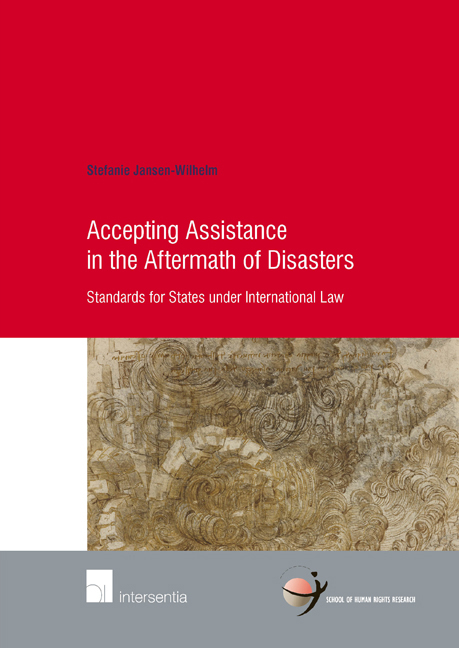Book contents
- Frontmatter
- Dedication
- Acknowledgements
- Contents
- List of Abbreviations
- Part I
- Part II
- Chapter IV The Content and Meaning of Article 2(1) ICESCR
- Chapter V Applying the ICESCR on Disaster Situations: Specific Obligations
- Chapter VI Final Conclusions
- Summary
- Bibliography
- Index
- Curriculum Vitae
- School of Human Rights Research Series
Chapter V - Applying the ICESCR on Disaster Situations: Specific Obligations
from Part II
Published online by Cambridge University Press: 12 December 2017
- Frontmatter
- Dedication
- Acknowledgements
- Contents
- List of Abbreviations
- Part I
- Part II
- Chapter IV The Content and Meaning of Article 2(1) ICESCR
- Chapter V Applying the ICESCR on Disaster Situations: Specific Obligations
- Chapter VI Final Conclusions
- Summary
- Bibliography
- Index
- Curriculum Vitae
- School of Human Rights Research Series
Summary
INTRODUCTION
To be able to place the findings of the previous Chapter in the light of disaster response, the framework as described in the first Part of this research will be included. This allows to see the obligations found for article 2(1) in the broader context of obligations on accepting humanitarian assistance. The three steps of the legal framework are the primary role of the affected state, the initiation or triggering of international humanitarian assistance, and the acceptance of international humanitarian assistance. The obligations of article 2(1) are placed in this framework to see how much room individual state parties receive to fulfil their obligations individually and when article 2(1) prescribes that states must look for international assistance and cooperation. As the last step, it will be considered how article 2(1) sets standards on accepting international assistance.
Apart from placing the findings of the previous Chapter in the light of disaster response and applying them on the substantive rights of the ICESCR, this Chapter will address a question that has remained unanswered so far. In Chapter II it was explained that derogation from human rights obligations is possible during the existence of a ‘state of emergency’, at least under the ICCPR. Before looking at disaster-specific obligations for state parties to the ICESCR, it would not be superfluous to first establish to what extent state parties to the ICESCR may derogate from their obligations in (post-) disaster obligations. Section 2 will provide an answer to this question. Next, in section 3, the findings of the previous Chapter will be considered in the context of disaster response resulting in an overview of the general obligations that states must adhere to immediately after a disaster. With these results, the rights to housing, food, water and health will be analysed in section 4 to find out whether any concrete standards can be identified that dictate the behaviour of state parties in the response to a disaster.
- Type
- Chapter
- Information
- Accepting Assistance in the Aftermath of DisastersStandards for States under International Law, pp. 153 - 196Publisher: IntersentiaPrint publication year: 2015

